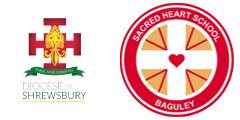Curriculum Statement Whole School
‘With joyful hearts, we love, learn and praise as the family of God’
Intent
At the heart of our school is our faith and mission. As a Catholic school, we follow the teachings of Jesus Christ and provide opportunities for our pupils to understand and reflect on the need to care for God’s world. Through Pope Francis' encyclical, Laudato Si, we aim to develop our pupils’ understanding of ‘caring for our common home’ through the idea of sustainability. This runs throughout our whole school with a focus on raising pupils’ awareness of the need to reduce, reuse and recycle. Alongside this we link the themes of Catholic Social Teaching, in which we teach our pupils the values of social justice and develop their understanding of moral, spiritual and cultural aspects of life.
At Sacred Heart, our knowledge engaged curriculum is built around the National Curriculum and is designed to:
provide high quality teaching which supports and develops age-appropriate subject specific knowledge through a well resourced and rich learning environment
ensure carefully planned and sequenced lessons provide pupils with new knowledge and skills which are built upon prior learning
develop stimulating and exciting learning opportunities for pupils which promotes and deepens subject knowledge and skill
provide for the needs of all pupils across the wider curriculum which are enhanced through extra-curricular provision and enhancement opportunities whilst developing resilience, risk-taking and independence
engage parents and carers in their child’s learning
be broad and balanced to reflect the diverse cultural background of our school and wider community
Implementation
At Sacred Heart, teachers have constructed a curriculum that is ambitious and designed to give all pupils, particularly disadvantaged pupils and pupils with SEND, the knowledge and wider experiences they need to succeed in life. Pupils develop their knowledge skills and abilities to apply what they know and can do with increasing fluency and independence.
Our approach is reflected in the expectations we have of our children, to at least achieve the standards set out in the Early Years curriculum by the end of Reception and the National Curriculum for Years 1-6 in all subjects with a focus on reading, writing, maths and science. At Sacred Heart we follow 'The Vine and the Branches' as part of our RE curriculum through which we expect our pupils to confidently articulate their ideas and thoughts, listen and reflect on the teachings of Jesus. In addition to this we incorporate Ten:Ten's 'Life to the Full' as part of our RSE program.
learning is sequenced to enable progression through age-related expectations where skills and knowledge are identified
subjects provide breadth of experiences through careful planning and enrichment opportunities with application across other curriculum areas to deepen understanding
knowledge maps for each foundation subject are utilised to focus and develop pupils’ subject knowledge and vocabulary through identifying prior learning and key skills
key strands of learning are identified and are re-visited to enable pupils to embed their understanding
we use the aspects of our local environment to make real life links to our community and include this as part of our wider curriculum focus on sustainability
Our approach to teaching and learning supports the curriculum ensuring that whilst pupils are guided in tasks, they are also challenged in their learning and encouraged to work independently. We recognise that children have different learning styles and so lessons are planned to engage pupils in becoming active learners, whilst supporting their differing learning needs.
We assess our pupils throughout their learning, using National Curriculum objectives with teachers monitoring pupil progress at regular intervals. Both formative and summative assessment is used to inform teaching and learning to ensure that children are building upon prior learning. We assess using test-based materials that are subject specific, through teacher observation and project work.
Impact
Our aim is that our pupils will be prepared, both academically and socially, for the next stage in their lives at secondary school and beyond in the modern world around us. They will be able to show tolerance of others, understanding in equality and social values of their relationships with others and respect for God’s world as shown in our core values and Mission.
We measure the impact on their learning by:
summative tests in reading, maths and science
teacher assessment and moderation of writing against agreed expectations
formative and summative assessment in RE through 'Check in' and 'Check out' tasks at the start and end of each branch, alongside assesment of pupil work against the expected outcomes as set out in the Religious Education Directory (RED23)
summative assessment in foundation subjects
assessment information is recorded on the school tracking system for curriculum subject leaders, teachers and senior leaders to track progress
termly pupil progress meetings to evaluate pupil’s individual progress and identify those who need individual/group support to achieve school and National expectations
behaviour and attendance data to evaluate the impact of behaviour and attendance policies on pupil’s outcomes in school
pupil voice surveys which demonstrate attitude and enjoyment towards learning
Our children will approach everyday challenges in a positive way, taking pride in their achievements and that of those around them. They will show resilience in overcoming obstacles and use the skills taught to achieve their best possible outcomes across all aspects of the curriculum, whilst knowing how and where to seek support when needed.
